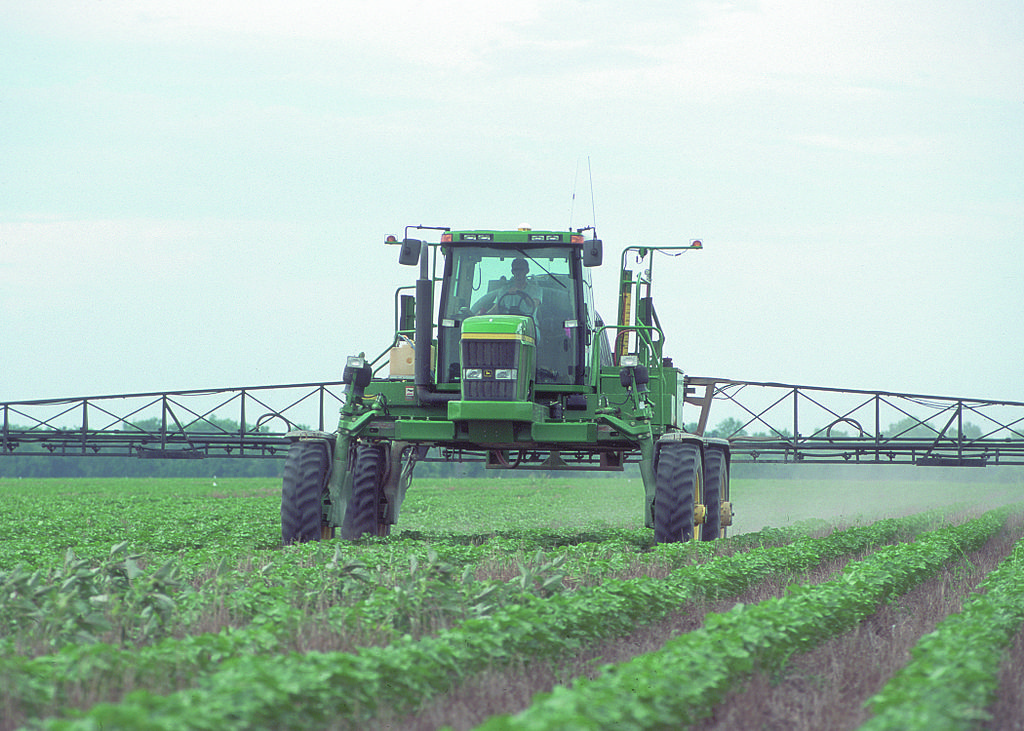Pesticide Drift Leads to Alleged Murder
An argument between two farmers on the border of Arkansas and Missouri over the pesticide dicamba led to the shooting death of one and the arrest on murder charges of the other, according to local media.
Pesticide Drift Leads to Alleged Murder
An argument between two farmers on the border of Arkansas and Missouri over the pesticide dicamba led to the shooting death of one and the arrest on murder charges of the other, according to local media.

Allan Curtis Jones, 26, a farmer from Arbyrd, Missouri, was arraigned this past Tuesday in Blytheville District Court in Arkansas on a first-degree murder charge and was released on $150,000 bail, Mississippi County Deputy Prosecuting Attorney Curtis Walker tells Modern Farmer in a phone interview. Jones has no previous criminal history, Walker says.
Jones allegedly shot Mike Wallace, a 55-year-old soybean and cotton farmer from Monette, Ark., just over the Missouri border, after the two met along a stretch of road near Leachville, Ark., at Wallace’s request on Oct. 27. The two had argued over the phone about the pesticide dicamba before meeting up, Sheriff Dale Cook told KIAT. Wallace had previously complained to the state Plant Board about his soybeans being damaged by drifting dicamba, the Arkansas Democrat-Gazette reports. There had previously been issues with dicamba being applied without permits to crops on a nearby farm at which Jones was an employee.

According to a news release by the Mississippi County Sheriff’s Office, Jones allegedly told deputies he and his cousin, whose name was not given in the release, met up with Wallace to discuss the dispute concerning the alleged spraying of dicamba on the farm where Jones works. When Wallace grabbed Jones by the arm during the argument, Jones pulled out a gun and shot the older man, who was unarmed. Jones’ cousin called 911 and deputies found Wallace dead by the side of the road when they arrived. Jones’ case will be tried in Mississippi County Circuit court. His next court appearance is on Dec. 30, the prosecutor tells Modern Farmer.
The shooting comes amid ongoing issues with farmers who say their crops were damaged due to drifting dicamba, a broad-spectrum herbicide used on some GMO soybeans and cotton that can kill other crops that aren’t resistant to the chemical.
Over the summer, more than 200,000 acres of non-dicamba resistsnt soybeans in Arkansas, Tennessee, and Missouri were damaged. In Missouri alone, there was dicamba damage to more than 42,000 acres of soybeans, peaches, watermelons, peanuts, alfalfa, and other crops, according to an EPA compliance advisory report issued in August.
The problem began when Monsanto released its new dicamba-resistant soybeans for the 2016 growing season that are only supposed to be sprayed with a new formulation of dicamba that is is less prone to drifting because it doesn’t easily vaporize. The new formula hasn’t yet been approved by the EPA, and although Monsanto said it explicitly told farmers not to use the older formula of dicamba on the the new seeds, some farmers did not heed the warning. Just last month the EPA served several warrants as part of a probe into the alleged misuse of the herbicide by farmers in the southeastern Missouri counties of Cape Girardeau, Dunklin, New Madrid and Stoddard, according to the Progressive Farmer website.
The damaged crops have pitted farmer against farmer and strained relationships in the region, especially in light of the fact that insurance companies won’t compensate farmers for losses caused by wrongful or “off label” herbicide applications due to drift, the St.Louis Post-Dispatch reported in October.
Follow us
This work is licensed under a Creative Commons Attribution-NoDerivatives 4.0 International License.
Want to republish a Modern Farmer story?
We are happy for Modern Farmer stories to be shared, and encourage you to republish our articles for your audience. When doing so, we ask that you follow these guidelines:
Please credit us and our writers
For the author byline, please use “Author Name, Modern Farmer.” At the top of our stories, if on the web, please include this text and link: “This story was originally published by Modern Farmer.”
Please make sure to include a link back to either our home page or the article URL.
At the bottom of the story, please include the following text:
“Modern Farmer is a nonprofit initiative dedicated to raising awareness and catalyzing action at the intersection of food, agriculture, and society. Read more at <link>Modern Farmer</link>.”
Use our widget
We’d like to be able to track our stories, so we ask that if you republish our content, you do so using our widget (located on the left hand side of the article). The HTML code has a built-in tracker that tells us the data and domain where the story was published, as well as view counts.
Check the image requirements
It’s your responsibility to confirm you're licensed to republish images in our articles. Some images, such as those from commercial providers, don't allow their images to be republished without permission or payment. Copyright terms are generally listed in the image caption and attribution. You are welcome to omit our images or substitute with your own. Charts and interactive graphics follow the same rules.
Don’t change too much. Or, ask us first.
Articles must be republished in their entirety. It’s okay to change references to time (“today” to “yesterday”) or location (“Iowa City, IA” to “here”). But please keep everything else the same.
If you feel strongly that a more material edit needs to be made, get in touch with us at [email protected]. We’re happy to discuss it with the original author, but we must have prior approval for changes before publication.
Special cases
Extracts. You may run the first few lines or paragraphs of the article and then say: “Read the full article at Modern Farmer” with a link back to the original article.
Quotes. You may quote authors provided you include a link back to the article URL.
Translations. These require writer approval. To inquire about translation of a Modern Farmer article, contact us at [email protected]
Signed consent / copyright release forms. These are not required, provided you are following these guidelines.
Print. Articles can be republished in print under these same rules, with the exception that you do not need to include the links.
Tag us
When sharing the story on social media, please tag us using the following: - Twitter (@ModFarm) - Facebook (@ModernFarmerMedia) - Instagram (@modfarm)
Use our content respectfully
Modern Farmer is a nonprofit and as such we share our content for free and in good faith in order to reach new audiences. Respectfully,
No selling ads against our stories. It’s okay to put our stories on pages with ads.
Don’t republish our material wholesale, or automatically; you need to select stories to be republished individually.
You have no rights to sell, license, syndicate, or otherwise represent yourself as the authorized owner of our material to any third parties. This means that you cannot actively publish or submit our work for syndication to third party platforms or apps like Apple News or Google News. We understand that publishers cannot fully control when certain third parties automatically summarize or crawl content from publishers’ own sites.
Keep in touch
We want to hear from you if you love Modern Farmer content, have a collaboration idea, or anything else to share. As a nonprofit outlet, we work in service of our community and are always open to comments, feedback, and ideas. Contact us at [email protected].by Andrew Amelinckx, Modern Farmer
November 4, 2016
Modern Farmer Weekly
Solutions Hub
Innovations, ideas and inspiration. Actionable solutions for a resilient food system.
ExploreExplore other topics
Share With Us
We want to hear from Modern Farmer readers who have thoughtful commentary, actionable solutions, or helpful ideas to share.
SubmitNecessary cookies are absolutely essential for the website to function properly. This category only includes cookies that ensures basic functionalities and security features of the website. These cookies do not store any personal information.
Any cookies that may not be particularly necessary for the website to function and are used specifically to collect user personal data via analytics, ads, other embedded contents are termed as non-necessary cookies.